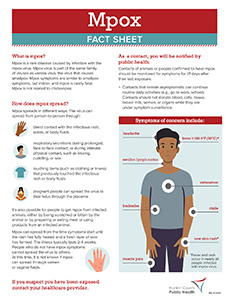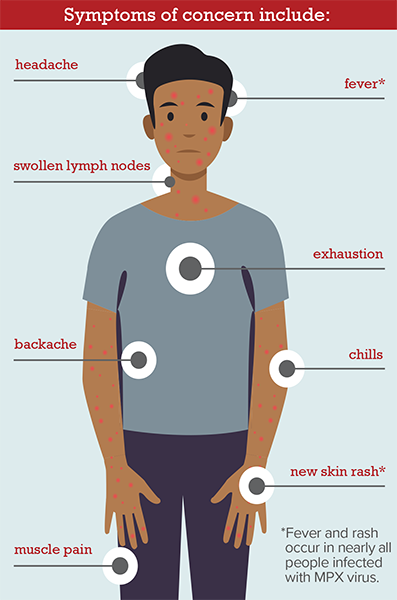What to Know Right Now
-
- Vaccines for mpox are limited nationwide. Franklin County Public Health (FCPH) supports the mpox vaccine clinics that are being held at Columbus Public Health.
- Mpox causes symptoms that can vary from uncomfortable to very painful, although it will rarely cause death.
- While anyone can get mpox, most of the cases reported in the current outbreak have been in men who have sex with men.
- The World Health Organization (WHO) declared mpox a public health emergency of international concern (PHEIC) at the end of July. The US made mpox a public health emergency in early August.
On This Page:
About Mpox
Mpox is a rare disease caused by the mpox virus. Mpox virus is part of the same family of viruses that causes smallpox. Mpox symptoms are similar to smallpox symptoms, but not as severe. Mpox is rarely fatal. Mpox is not related to chickenpox.
Mpox spreads in different ways:
Direct contact with mpox rash, scabs or body fluids
Breathing in droplets from an infected person – such as sneezing or discharge - during face-to-face contact, such as kissing, cuddling or sex
Touching items (clothing or bedding) that previously touched the rash or body fluids of an infected person
Mpox Symptoms
Mpox symptoms of concern include:
- Headache
- Fever*
- Swollen lymph nodes
- Exhaustion
- Backache
- Chills
- New skin rash*
- Muscle pain
* Fever and rash occur in nearly all people infected with mpox virus.
If you think you have been exposed or have mpox symptoms like a rash, contact your doctor. Testing is the best way to determine if an infection is mpox. While you wait for your test results, avoid close contact with others and wear a face mask if isolation is not possible.
Did you know?
- A mpox rash will go through many stages, including scabbing, before healing.
- Mpox can be spread from the time symptoms start until the rash has completely healed and a fresh layer of skin has formed.
- The sickness usually lasts 2–4 weeks.
Additional Resources
- Vaccine information from the CDC.
- Learn more about mpox vaccines and clinics by visiting Columbus Public Health's webpage.
- For an up-to-date map and case count, visit the CDC situational summary page.
- Ohio Department of Health's mpox Case Dashboard
- Mpox Toolkit for Schools and Early Care and Education Programs
- Mpox Toolkit for Institutions of Higher Education
Vaccine Information
Franklin County Public Health is supporting the mpox vaccination clinics offered at Columbus Public Health. Learn more about mpox vaccines and clinics by visiting the Columbus Public Health’s webpage.
The mpox vaccine (called JYNNEOS) is approved by the FDA for those who are 18 years and older, however, supplies are limited. Columbus Public Health and FCPH are working with community partners to offer the vaccine to those most at risk as quickly as possible.
The vaccine is provided four to 14 days after being exposed to mpox. It can also be used for prevention. It requires two doses, given 28 days apart.
Frequently Asked Questions (FAQs)
Mpox is a rare disease caused by the mpox virus. Mpox virus is part of the same family of viruses that causes smallpox. Mpox symptoms are similar to smallpox symptoms, but not as severe. Mpox is rarely fatal. Mpox is not related to chickenpox. Mpox spreads in different ways. The virus can spread from person-to-person through: Mpox can spread from the time symptoms start until the rash has fully healed and a fresh layer of skin has formed. The illness typically lasts 2-4 weeks. People who do not have mpox symptoms cannot spread the virus to others. Testing is the best way to determine if an infection is mpox. Contact your doctor if you have a new rash or had close contact with someone who may have had mpox. While you wait to hear your test result, avoid close contact with others, including sex and cuddling. Cover skin rashes and wear a face mask if isolation is not possible. Anyone can get mpox. You are at a higher risk if you:
For more information, or for questions, contact fcph@franklincountyohio.gov.


